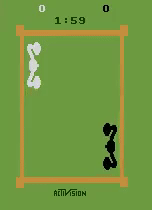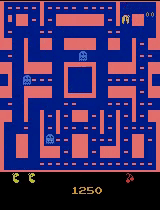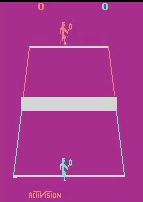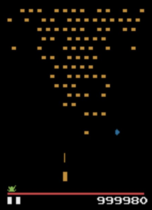XXX
Please note this project is under active development and may change over time. Treat it as an open beta.
Once you start doubting, just like you’re supposed to doubt, you ask me if the science is true. You say no, we don’t know what’s true, we’re trying to find out and everything is possibly wrong.
–Richard P. Feynman, The Pleasure of Finding Things Out: The Best Short Works of Richard P. Feynman.
- Abstract
- Quick Start
- Running the code
- Benchmarks
- Additional Resources
- Cite us
- FAQ
- About the Authors
- Todo
- Bibliography
Fractal AI (arXiv) is a theory for efficiently sampling state spaces. It allows one to derive new mathematical tools that could be useful for modeling information using cellular automaton-like structures instead of smooth functions.
In this repository we present a new agent called Fractal Monte Carlo Agent, derived from the first principles of the theory. The agent is capable of solving Atari games under the OpenAI Gym several orders of magnitude more efficiently than similar techniques, such as Monte Carlo Tree Search (MCTS) [1].
We also present the Swarm Wave algorithm, a tool derived from Fractal AI (FAI) that allows one to solve Markov decision processes under a perfect model of the environment. Under this assumption, the algorithm is about five orders of magnitude more efficient than MCTS, effectively "solving" a substantial number of Atari games.
The code provided under this repository exemplifies how it is now possible to beat some of the current state-of-the-art benchmarks on Atari games and a large sample of top-performing examples with little computation required, turning Reinforcement Learning (RL) into a supervised problem.
The algorithms propose a new approach to modeling the decision space, while maintaining control over any aspects of the agent's behavior. The algorithms can be applied to both sampling discrete and continuous state spaces.
To quickly understand the fundamentals of Fractal AI you can refer to the Introduction to FAI. The document provides a brief explanation of the algorithms here presented and their potential applications on the field of Reinforcement Learning.
To proof how how the Fractal Monte Carlo Agent performs on any Atari game you can refer to the FMC example notebook. The example allows runs either using the RAM content or pixel render as observations.
To better understand how the Swarm Wave algorithm works in practice you can refer to the Swarm Wave example notebook.
Pleas note the authors are open to discuss the ideas and code here presented under the conceptual framework of Reinforcement Learning and its standard terminology.
The code provided aims to be both simple and self-explanatory. Requirements and instructions to set up the environment are provided below.
- Python 3. Python 2 is not supported nor currently expected to be supported.
- Python numpy library.
- Python OpenAI Gym [Atari] [2].
- OpenAI Gym dependencies.
- (Optional) Jupyter Notebook for running the example notebooks provided.
As a first step, install the dependencies as explained on the OpenAI gym documentation:
To install the full set of environments, you'll need to have some system packages installed. We'll build out the list here over time; please let us know what you end up installing on your platform. In case you want to run the notebook:
pip3 install jupyterOn OSX:
brew install cmake boost boost-python sdl2 swig wgetOn Ubuntu 14.04:
sudo apt-get install -y python-numpy python-dev cmake zlib1g-dev libjpeg-dev xvfb libav-tools xorg-dev python-opengl libboost-all-dev libsdl2-dev swig libav-tools
On the terminal, run:
git clone git@github.com:FragileTheory/FractalAI.git
cd FractalAI
sudo pip3 install -e .It doesn't matter how beautiful your theory is, it doesn't matter how smart you are.
If it doesn't agree with experiment, it's wrong.
–Richard P. Feynman
The results for the benchmarks provided come from a single (Razer Blade laptop) using the Fractal Monte Carlo Agent (FMC) through the code from the reference implementation provided in this repository. The parameters utilized were chosen according to the the first principles of the theory. The performance observed corresponds with the expected values.
| Total number of games available | 56 | 100.0% |
|---|---|---|
| Games played by FMC | 52 | 92.9% |
| Games where FMC defeats the state-of-the-art | 41 | 78.8% |
| Games solved or defeats the human record | 17 | 32.7% |
The following table depicts the Fractal Monte Carlo Agent performance based on widely accepted benchmarks within the reinforcement learning community.
For each game played by the agent, the following information is is provided:
- Human record: the maximum score achieved by a human player, as reported in [8].
- SotA: stands for "State of the Art":
- Represents the best score achieved by any of the following algorithms: Random, DQN, C51 DQN, NoisyNet-DQN, Dueling, NoisyNet-Dueling, A3C, NoisyNet-A3C, A2C, HyperNEAT, ES FF, and MCTS.
- Take into account when interpreting the benchmark table that some of the scores are reported as an average across multiple runs (at most 100). See [1], [3], [4], [5], [6], [7]. A detailed source for each score can be found in the detailed performance sheet.
- FMC: the maximum score achieved by Fractal Monte Carlo Agent in the games documented. The number of runs for each game and the parameters used may vary between each game.
- FMC vs SotAa: Relative performance of FMC vs. the corresponding State of the Art.
| Game | Human Record | SotA | FMC | FMC vs SotA |
|---|---|---|---|---|
| alien | 251916 | 5899 | 19380 | 329% |
| amidar | 155339 | 2354 | 4306 | 183% |
| assault | 8647 | 11477 | 2782 | 24% |
| asterix | 335500 | 406211 | 999500 | 246% |
| asteroids | 10004100 | 26380 | 76270 | 289% |
| atlantis | 7352737 | 8782433 | 10000100 | 114% |
| bank heist | 199978 | 1611.9 | 1645 | 102% |
| battle zone | 863000 | 42767 | 50000 | 117% |
| beam rider | 999999 | 30276.5 | 288666 | 953% |
| berzerk | 1057940 | 3409 | 13290 | 390% |
| bowling | 300 | 135.8 | 86 | 63% |
| boxing | 100 | 99.4 | 100 | 101% |
| breakout | 748 | 750 | 100% | |
| centipede | 1301709 | 25275.2 | 1351000 | 5345% |
| chopper command | 999900 | 15600 | 999900 | 6410% |
| crazy climber | 447000 | 179877 | 238300 | 132% |
| demon attack | 999970 | 130955 | 999970 | 764% |
| double dunk | 5 | 20 | 400% | |
| enduro | 3617.9 | 3454 | 5279 | 153% |
| fishing derby | 71 | 49.8 | -1 | -2% |
| freeway | 34 | 33.9 | 33 | 97% |
| frostbite | 552590 | 7413 | 485000 | 6543% |
| gopher | 120000 | 104368.2 | 616000 | 590% |
| gravitar | 1673950 | 805 | 2600 | 323% |
| hero | 1000000 | 38874 | 36625 | 94% |
| ice hockey | 36 | 10.6 | 64 | 604% |
| jamesbond | 45550 | 4214 | 9600 | 228% |
| kangaroo | 1436500 | 14854 | 7100 | 48% |
| krull | 1006680 | 12601.4 | 277000 | 2198% |
| kung fu master | 1000000 | 48375 | 144100 | 298% |
| montezuma | 1219200 | 273.7 | 2500 | 913% |
| ms pacman | 290090 | 6283 | 58521 | 931% |
| name this game | 25220 | 15572.5 | 53010 | 340% |
| phoenix | 4014440 | 70324.3 | 250450 | 356% |
| pitfall | 114000 | 123 | 0 | 0% |
| pong | 21 | 21 | 21 | 100% |
| private eye | 103100 | 15095 | 40680 | 269% |
| qbert | 2400000 | 23784 | 35750 | 150% |
| riverraid | 194940 | 21162.6 | 18510 | 87% |
| road runner | 2038100 | 69524 | 54000 | 78% |
| robotank | 74 | 65.3 | 94 | 144% |
| seaquest | 527160 | 266434 | 999999 | 375% |
| skiing | 32,72 | 15442.5 | 0% | |
| solaris | 281740 | 11830 | 93520 | 791% |
| space invaders | 621535 | 15311.5 | 17970 | 117% |
| star gunner | 77400 | 125117 | 1600 | 1% |
| surround | 6.8 | 0% | ||
| tennis | 24 | 23.1 | 24 | 104% |
| time pilot | 66500 | 11666 | 0% | |
| tutankham | 3493 | 321 | 342 | 107% |
| up n down | 168830 | 145113 | 999999 | 689% |
| venture | 31900 | 3800 | 1500 | 39% |
| video pinball | 999999 | 949604 | 999999 | 105% |
| wizard of wor | 233700 | 12352 | 93090 | 754% |
| yars revenge | 15000105 | 69618.1 | 0% |
We provide a more detailed Google Docs spreadsheet where the performance of the Fractal Monte Carlo Agent is logged relative to the current alternatives. In the spreadsheet we also provide the parameters used in each of the runs.
If you find any outdated benchmarks or for some reaons you are unable to replicate some of our results, please open an issue and we will update the document accordingly.
You can help us while running the example by yourself and sending us your results:
- Record a video using our FMC example notebook.
- Provide the parameters used in the run.
- Provide the mean time as displayed as output in the notebook.
- Provide information about the system in which you ran the example.
- Share all of the above with us. You can do that in two ways:
- Upload the
mp4file generated to YouTube. Post the URL on Twitter alongside the corresponding information in the tweet content, and use use the hashtag #Fractal_ATARI. - Open an issue in this repository with the video/URL and corresponding information.
- Upload the
We appreciate all your contributions.
We are currently building a tool that will allow for testing our theory at larger scale. We aim to provide confidence intervals for the results, by using different parameter combinations.
Fractal AI: A Fragile Theory of Intelligence: This document explains the fundamental principles of the Fractal AI theory in which our Agent is based. We worked all the fundamental principles completely from scratch to build our own solution. We try to be consistent with existing terminology, and this document should contain everything you need to understand the theory. Comments on how to better explain the content are appreciated.
EntropicAI, Sergio Hernández Cerezo's blog: Here you can find the evolution of the research process for developing this algorithm, documented and explained, as well as experiments which aim to apply the theory to other fields of research.
Fractal AI playlist: In the Youtube playlist you can find videos of the accomplishments over the years. Besides the recordings Atari games using the Agent, you can find videos recorded using a custom library that allows one to create different tasks in continuous control environments, as well as visualizations of how the Agent samples the state space.
GAS paper [9]: A manuscript describing an application of the Fractal AI theory on general optimization problems. There are certainly better ways to apply the theory such problems, yet it illustrates why code is better than maths to explain the theory. When trying to formalize it, things can get really non-intuitive.
Causal Entropic Forces by Alexander Wissner-Gross [10]: The fundamental concepts behind this paper inspired the present research. We develop our theory aiming to calculate future entropy more quickly and being able to leverage the information contained in the Entropy of any state space, together with any potential function.
@misc{1803.05049,
Author = {Sergio Hernández Cerezo and Guillem Duran Ballester},
Title = {Fractal AI: A fragile theory of intelligence},
Year = {2018},
Eprint = {arXiv:1803.05049},
}
As questions regarding the research and methodology we will address them under the FAQ.
You can refer to the FAQ document.
Authors:
- Sergio Hernández Cerezo: Studied mathematics, works as programmer, dreams about physics.
- Guillem Duran Ballester: Rogue scientist, loves learning and teaching. Currently looking for work opportunities related to AI.
The authors have developed the theory as personal side projects driven purely by intellectual curiosity. Guillem worked on it while attending college, and Sergio while working as a programmer. The authors are not part of academia, have no corporate affiliation and no formal track record.
All the time and resources involved came from the authors themselves, besides the support from:
- HCSoft, which supported our research and believed the ideas since the very beginning.
- source{d}, which kindly sponsored the project for 6 months.
We currently do not have the resources to further carry our research. We will gladly accept contributions or sponsorships that allow us to continue working with what is our passion.
Special thanks: We want to thank all the people who has believed in us along the years. Their patience, understanding and support made possible for this project to evolve to this point.
- Our families, HCSoft, Guillem's parents: Joan and Francisca, Eulàlia Veny, and Fina.
- The people at source{d}, specially Eiso Kant, Waren Long, Vadim Markovtsev, Marcelo Novaes, and Egor Bulychev.
- Everyone who believed in our "alien math" since Guillem was in college, specially José M. Amigó, Antoni Elias, Jose Berengueres, Javier Ozón, Samuel Graván, and Marc Garcia.
We are actively working in improving this project, and we welcome all contributions. Some of the to-dos in our roadmap:
- Making the repository more friendly to academia.
- Improving the Introduction to Fractal AI document.
- Improving code clarity and docstrings.
- Updating Benchmarks with current records.
- Providing a command line interface (CLI).
- Uploading the project to pip and Conda package managers.
- Creating a Docker container for ease of use.
-
[1] Guo, Xiaoxiao and Singh, Satinder and Lee, Honglak and Lewis, Richard L and Wang, Xiaoshi. Deep Learning for Real-Time Atari Game Play Using Offline Monte-Carlo Tree Search Planning. NIPS2014_5421, 2014.
-
[2] Greg Brockman and Vicki Cheung and Ludwig Pettersson and Jonas Schneider and John Schulman and Jie Tang and Wojciech Zaremba. OpenAI Gym . arXiv:1606.01540, 2016.
-
[3] Marc G. Bellemare, Will Dabney Rémi Munos. A Distributional Perspective on Reinforcement Learning. arXiv:1707.06887, 2017.
-
[4] Meire Fortunato, Mohammad Gheshlaghi Azar, Bilal Piot, Jacob Menick, Matteo Hessel, Ian Osband, Alex Graves, Vlad Mnih, Remi Munos, Demis Hassabis, Olivier Pietquin, Charles Blundell, Shane Legg. Noisy networks for exploration. arXiv:1706.10295, 2018.
-
[5] Volodymyr Mnih & others. Human-level control through deep reinforcement learning. doi:10.1038/nature14236, 2015.
-
[6] Matthias Plappert, Rein Houthooft, Prafulla Dhariwal, Szymon Sidor, Richard Y. Chen, Xi Chen, Tamim Asfour, Pieter Abbeel, Marcin Andrychowicz. Parameter Space Noise for Exploration. arXiv:1706.01905, 2017.
-
[7] Tim Salimans, Jonathan Ho, Xi Chen, Szymon Sidor, Ilya Sutskever. Evolution Strategies as a Scalable Alternative to Reinforcement Learning. arXiv:1703.03864, 2017.
-
[8] ATARI VCS/2600 Scoreboard. Atari compendium, 2018.
-
[9] Sergio Hernández, Guillem Duran, José M. Amigó. General Algorithmic Search. arXiv:1705.08691, 2017.
-
[10] Alexander Wissner-Gross. Causal entropic forces. Physical Review Letters, 2013.
-
[11] Shane Legg Machine Super Intelligence. Doctoral Dissertation , 2008.




